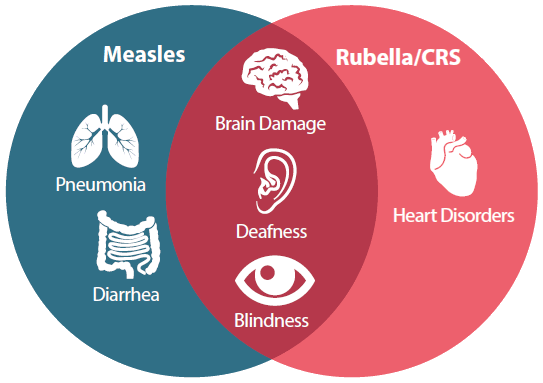About Global Measles, Rubella, and Congenital Rubella Syndrome (CRS)
Updated November 16, 2023
Measles and rubella can be prevented by vaccines.
Measles and rubella are vaccine-preventable diseases (VPD). Measles and rubella vaccines are safe and effective and have been in use since the 1960s. Two doses of a measles vaccine provides protection against measles. One dose of a rubella vaccine provides life-long protection.
Measles and rubella can cause serious illness, birth defects, and death.
Measles and rubella are diseases that can lead to serious health complications, or even death.
Health problems caused by these diseases overlap. Each of them can cause brain damage, deafness, and blindness. Measles can cause pneumonia and diarrhea, while rubella and congenital rubella syndrome can lead to heart disorders. In unvaccinated pregnant women, rubella can lead to miscarriage, stillbirth or multiple birth defects that together are called congenital rubella syndrome (CRS).

[Above: Health problems possible from measles and rubella / congenital rubella syndrome (CRS) overlap.]
CDC’s U.S. Measles and Rubella websites have more information on the signs and symptoms:
Measles and rubella are leading causes of death, disease, and economic burden globally.
In 1980, before widespread global use of measles vaccine, an estimated 2.6 million measles deaths occurred worldwide. While much progress has been made, including more than 57 million measles-related deaths prevented through vaccination from 2000 – 2022, measles still claimed the lives of over 136,000 people (mostly children) in 2022.
In 2022, the estimated number of measles cases was over 9 million. The health consequences of measles and rubella infection can be lifelong, including economic losses for individuals, families, and societies.
The last major rubella pandemic in 1962-1965 included an estimated 12.5 million infections and negatively affected 33,350 pregnancies in the United States. The development of a rubella vaccine reduced infections by as much as 78%, 3 years after introduction. Seventy percent of all infants worldwide have access to the rubella vaccine. As of February 2022, almost 50 percent of countries have eliminated rubella and congenital rubella syndrome, but 19 countries have not started using the rubella vaccine.
Read the latest science :